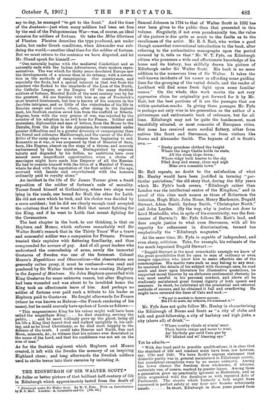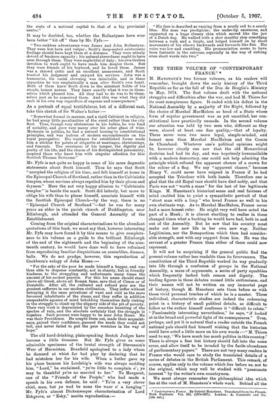THE EDINBURGH OF SIR WALTER SCOTT.* No fuller or better
picture of that brilliant half-century of life in Edinburgh which approximately lasted from the death of
• Edinburgh under Sir Walter Scott. By Co. W. T. Fyfe. With an Introduction by B. S. Bait. London : A. Constable and ElOs. 6c1.] Samuel Johnson in 1784 to that of Walter Scott in 1832 has ever been given to the public than that presented in this volume. Singularly, if not even paradoxically too, the value of the picture is due quite as much to the faults au; to the excellences of the artist. Mr. R. S. Rait, who writes a good though somewhat conventional introduction to the book, after
referring to the authoritative monographs upon the period covered by it, tells ns that " Mr. W. T. Fyfe, an Edinburgh citizen who possesses a wide and affectionate knowledge of his home and its history, has skilfully drawn his picture of Edinburgh under Sir Walter Scott. His book is no mere addition to the numerous lives of Sir Walter. It takes the well-known incidents of his career as affording some guiding lines for the grouping of the varied details, and the reader of Lockhart will find some fresh light upon some familiar names." On the whole, this work merits the not very aggressive claim for originality put forward for it by Mr. Rait, but the best portions of it are the passages that are within quotation-marks. In giving these passages Mr. Fyfe is perhaps not only wise in his generation as the author of a
picturesque and enthusiastic book of reference, but for all time. Edinburgh may not be quite the handsomest, most beautifully situated, or most romantic of European cities. But none has received more cordial flattery, either from natives like Scott and Stevenson, or from visitors like
Burns and Alexander Smith. The keynote of all is Scott's own :— " Dusky grandeur clothed the height Where the huge Castle holds its state,
All the steep slope down;
Whose ridgy back heaves to the sky Piled deep and massy, close and nigh Mine own romantic town."
Mr. Rait repeats, no doubt to the satisfaction of what Mr. Henley would have been justified in terming " par-
ticular patriotism," the old story that, during the fifty years which Mr. Fyfe's book covers, " Edinburgh rather than London was the intellectual centre of the Kingdom," and in proof of this cites such names as those of Robertson the historian, Hugh Blair, John Home, Henry Mackenzie, Dugald Stewart, Adam Smith, Sydney Smith, " Christopher North," and John Leyden. (By the way, why is justice not done to Lord Monboddo, who, in spite of his eccentricity, was the fore- runner of Darwin ?) Mr. Fyfe follows Mr. Rait's lead, and does ample justice to what even Stevenson, with all his capacity for refinement in discrimination, termed too emphatically the " Edinburgh magnates."
At the same time, Mr. Fyfe is capable of independent, and even sharp, criticism. Take, for example, his estimate of the too much bepraised Dugald Stewart :—
" Dugald Stewart is the most remarkable example we know of the great possibilities that lie open to men of ordinary or even meagre capacities who know how to make effective use of the commonplace. His merits were such as may belong to any man ; he mastered the details of his subject with thorough oars, he read much and drew upon literature for illustrative quotations, he supported moral theories by an elaborate sentimental rhetorio, he was most careful in his personal conduct, and above all lie studiously maintained great formal dignity of both speech and manners. In short, he cultivated all the prudential and external methods of success, and he obtained it full and overflowing. He might have reversed the lines of Cato and said :— • 'Tis not in mortals to deserve success ; But I'll do more, my subjects, I'll oommand it.' "
Mr. Fyfe does not quite follow Mr. Henley in characterising the Edinburgh of Burns and Scott as "a city of clubs and talk and good-fellowship, a city of harlotry and high jinks, a city (above all) of drink,"-
" Whare conthy chiels at e'enin' meet Their bizzin craigs and mous to west, An' blythely gar auld Care gae by Wi' blinket and wi' bleering eye."
Yet he admits,—
" With due heed paid to possible qualifications, it is clear that the standard of life and conduct must have been low between, say, 1780 and 1820. We have Scott's express statement that domestic purity was in general maintained in Edinburgh society, but scandalous exceptions were by no means unknown. Among the lower classes the freedom from wholesome, if irksome, restraints was, of course, marked by greater lapses. Among them a generation grew up practically ignorant as Hottentots, and as little acquainted with the decalogue as with repeated Acts of Parliament. The streets which formerly a lady might have traversed in perfect safety at any hour now became notoriously unsafe In short, Edinburgh in those years passed from
the state of a national capital to that of a big provincial centre."
It may be doubted, too, whether the Ballantynes have ever been better " hit off " than by Mr. Fyfe
"Two reckless adventurers were James and John Ballantyne. They were low-born and vulgar ; Scott's deep-seated aristocratic feelings should have kept them at a distance. They were utterly devoid of business capacity ; his natural shrewdness ought to have seen through them. They were neglectful of duty ; his own tireless devotion to work ought to have made him despise them. But they were friends of his boyhood, and he loved them. James was a shrewd critic and an excellent amanuensis, and Scott trusted his judgment and enjoyed his services. John was a hurnourist, his social clowning was inimitable, and in these capacities he was emphatically a man after Scott's own heart. Both of them knew Scott down to the minutest foible of his simple, honest nature. They knew exactly what it was in them- selves which pleased him. All they had to do was to be them- selves just as he conceived them. And this was what they did each in his own way regardless of expense and consequences."
As a portrait of equal truthfulness, but of a different cast, take this sketch of Sir Walter's father :- "Somewhat formal in manner, and a rigid Calvinist in religion, he.had many little peculiarities of the rural rather than the city Scot. Thus, though very abstemious in his habits, he was fond of sociality, and grew very merry over his sober glass of wine. Moderate in politics, he had a natural leaning to constitutional principles, and was jealous of modern encroachments on the royal prerogative. His weakness for established forms made him a stickler for points of etiquette at marriages, christenings, and funerals. The sweetness of his temper, the dignity and purity of his life, and the charm of his distinguished personality, inspired those who knew him with singular affection for this Scottish Thomas Newcomer'
Mr. Fyfe is not quite so happy in some of his more dogmatic statements about Scott himself. Thus he says that Scott "accepted the religion of his time, and felt himself at home in the Episcopal Church of Scotland, rather than in the Calvinistic temples, whose services always repelled him by their gloom and dryness." Here the not very happy allusion to " Calvinistic temples " is beside the mark. Scott did latterly, but more to oblige his wife than to please himself, associate himself with the Scottish Episcopal Church—by the way, there is no " Episcopal Church of Scotland "—but he was for many years an elder in the parish church of Duddingston, near Edinburgh, and attended the General Assembly of the Establishment.
Coming from the original characterisations to the abundant quotations of this book, we must say that, however interesting Mr. Fyfe may have found it by this means to give complete- ness to his volume as a guide to the brilliant Edinburgh of the end of the eighteenth and the beginning of the nine- teenth century, he would have done well to have refrained from reproducing familiar disquisitions on assemblies, dinners, balls. We do not grudge, however, this reproduction of Cockburn's eulogy of John' Home
:- "For the sake of the poor he made himself a beggar, and was thus able to dispense constantly, not in charity, but in friendly kindness, to the struggling and unfortunate many times the amount of his modest pension. For this his name should stand above all Greek, above all Roman fame, save that of Cimon or of Donatello. After all, the cultured and refined poor are the greatest sufferers in our modern civilisation. They suffer without betraying it the same privations of want and cold as the more favoured inhabitants of the slums, and they suffer in addition unspeakable agonies of mind beholding themselves daily sinking in the struggle to climb up the slippery side of the pit of poverty. Their very work is depreciated by the ceaseless haunting of the spectre of ruin, and the absolute certainty that the struggle is hopeless. Such persons were happy to be near John Home. He was their Providence. He sought them out, made their acquaint- ance, gained their confidence, guessed the needs they could not tell, and never failed to put the poor wretches in the way of hope."
The old hard-drinking, plain-speaking Scotch Judges have become a little tiresome. But Mr. Fyfe gives us some admirable specimens of the brutal strength of Stevenson's Weir of Hermiston. Braxfield apologised to a lady whom he damned at whist for bad play by declaring that be had mistaken her for his wife. When a butler gave up his place because his Lordship's wife was always scolding him, "Lord," he exclaimed, "ye've little to complain o'; ye may be thankful ye're no married to her." To Margarot, one of the " Friends of the People," who had made a speech in his own defence, he said : " Ye're a very clever chiel, man, but ye wad be nane the waur o' a hanging." Mr. Fyfe's almost Dickensesque characterisation of Lord Eskgrove, or " Esky," merits reproduction :— " His face is described as varying from a scurfy red to a scurfy blue. His nose was prodigious ; the under-lip enormous, and supported on a huge clumsy chin which moved like the jaw of a Dutch dog. He walked with a slow stealthy step something between a walk and a hirple, and helped himself on by short movements of his elbows backwards and forwards like fins. His voice was low and rumbling. His pronunciation seems to have been fantastic in the extreme, especially in the way of cutting even short words into two."































































 Previous page
Previous page